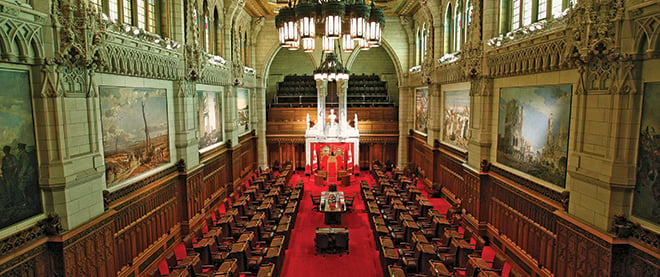Why we can’t just ignore the Senate and hope it goes away
The latest half-baked plan for Senate reform
Share

A very bad idea is spreading among the Canadian political class, and it’s a case of constitutional folly that has suddenly earned bi-partisan support. Held by NDP leader Thomas Mulcair and now supported by Saskatchewan Premier Brad Wall and other commentators, this is the idea that the Senate can be abolished (or its abolition instigated) if the prime minister simply stops making Senate appointments.
There are a number of reasons why the prime minister simply refusing to make Senate appointments over the long-term is, in fact, unconstitutional. The first is that it is clearly contrary to constitutional convention. Conventions are the unwritten, binding rules of practice that ensure our system of government operates. Our entire democracy depends on trust that political actors adhere to long-standing customs of practice, and a long-term refusal to maintain membership of the upper house would obviously contradict that tenet.
Indeed, one would hope a prime minister who so flagrantly violated convention in this manner would lose the confidence of members of the House of Commons, but in a majority government scenario where the PM enjoys the support of his or her caucus, that is far from assured. Further, there is nothing courts can do to enforce unwritten conventions; as important as they are, they are generally regarded as a non-justiciable form of constitutional law.
Second, the text of the Constitution itself implies that Senate appointments are not just a discretionary power but are, rather, a duty. Section 24 states that “The Governor General shall from Time to Time, in the Queen’s Name, by Instrument under the Great Seal of Canada, summon qualified Persons to the Senate…”. Formally, the governor general appoints senators, in practice it is the prime minister’s decision (those pesky conventions cropping up again). From a textual perspective the “shall” is important, and it suggests this something the governor general (again, in practice, the prime minster) is required to do, at least from “time to time”.
But what would the Supreme Court do if faced with such a challenge? Interpreting the “shall” in section 24 would likely be unnecessary, because the Court’s ruling in the Senate reference decision from three months ago suggests that killing the Senate by neglect is likely impermissible. There, the justices ruled that any fundamental change to the Senate’s operation or powers requires provincial consent under Part V of the Constitution Act, 1982. This plainly suggests that a long-term refusal to appoint senators would stand as an unconstitutional attempt to change or abolish the Senate.
The irony of all of this is that killing the Senate by simple attrition of its membership is a tactic favoured by people who want the upper house gone, but recognize, in large part due to last April’s Supreme Court reference opinion, that Parliament can’t institute major reform or abolition by itself. On that basis, one would have thought these folks would have read what the justices said a little more carefully. (Full disclosure: I was consulted by the Liberals before Justin Trudeau announced his own plan for Senate reform.)
The justices were clear that any change to “the Senate’s fundamental nature and role as a complementary legislative body of sober second thought” is implicated by the amending formula. They found that an attempt to impose term limits on senators would have this effect, because an attempt to reduce the term in office of senators “might impair the functioning of the Senate” (para. 79). There is little question that, if appointments ceased, at some point the upper house would not be able to function in its role as “a complementary legislative body of sober second thought.”
And I would argue we would hit this point well before the Senate was reduced to the 15 members it requires for quorum; the Senate’s deliberative capacity, even the effective functioning of its committee system, are fundamental to its role as described by the Court. Notably, if we ever did reach the point at which the Senate membership fell below quorum, Parliament itself would no longer be able to pass any laws. In an operative sense, then, at a certain point this tactic of killing the Senate by attrition is constitutionally suicidal.
Some have asked what would happen if the Supreme Court ordered the prime minister to make Senate appointments and he or she refused? The answer is the same as if the PM flatly refused to adhere to any constitutional decision by the Court: we would have a constitutional crisis on our hands. Frankly, we should hope it never gets to that point.
It is lamentable enough that so many seem so eager to flout the Constitution with what they perceive as a clever loophole or tactic to abolish the Senate. It is unprincipled, crass opportunism—an attempt to exploit the unpopularity of the upper house among the public by playing dangerous games with—indeed, flat out ignoring—our constitutional rules. It is also hypocritical: Mulcair has accused Stephen Harper of “doing an end-run around the rules” in other contexts, but seems quite willing to attempt the same here.
Worst of all, this speaks of an enduring immaturity about the Constitution generally among our political class. After years of failed attempts at reform, after the scandals that have plagued the Senate, after watching the government enter into a petty public relations spat with the Chief Justice over appointments to the Court itself, and after finally getting some clarity over the requirements of major constitutional amendment in this country, when are we going to grow up?
Emmett Macfarlane is an assistant professor of political science at the University of Waterloo. His book, Governing from the Bench: The Supreme Court of Canada and the Judicial Role was published last year by UBC Press.